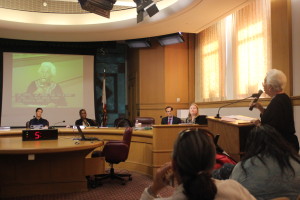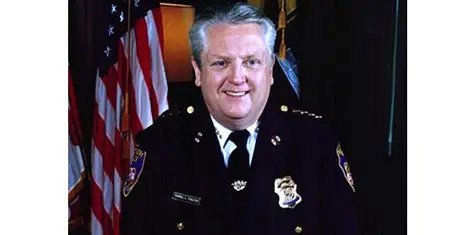Judge Backs Placing Civilian Complaint Intake in Police Department
Sep 13, 2013
Posted in Police-Public Safety
By Tasion Kwamilele and Ken Epstein
Federal Judge Thelton Henderson and federal Compliance Director Thomas Frazier surprised police accountability activists this week when they announced they have decided to place civilian complaint intake technicians within the Internal Affairs Division of the Oakland Police Department.
Their decision effectively overrules the Oakland City Council, which had voted to allocate funds in the budget to hire intake technicians within the Civilian Police Review Board (CPRB).
Frazier said that he had met with Henderson this week and that they had decided that the intake unit should be part of the Oakland Police Department, according to an email Frazier send Wednesday to Rashidah Grinage, executive director of PUEBLO, who has been one of those spearheading recent police accountability efforts.

Frazier had previously sent an email to Grinage saying he wanted the civilian intake technicians to be trained within the police department but that he did not object to having the technicians housed at CRBP, which means they would be under civilian supervision.
Henderson’s office said the judge did not take calls from the media. At press time, Compliance Director Frazier had not returned a request for an interview from the Post.
Grinage said she understands why Compliance Director Frazier might want to place all intake of complaints against police within the OPD., though she does not agree with him.
“My guess is the compliance director’s primary goal is to bring the police into compliance with the Negotiated Settlement Agreement (NSA),” which commits the city to police reform and assigns the federal court to oversee the agreement.
“He probably doesn’t think this is worth making the police angry,” said Grinage. “If I were in his place, I might have the same point of view.
However, Grinage said, “I am in the process of writing a letter to the judge because he did not have a full picture or the full context for this, when he made his decision.

“He’s entitled to know how the community views this. We don’t believe he received that perspective from Tom Frazier, ” she said, adding that she hopes City Council members will also write letters as will members of the Citizens Police Review Board.
“We can give this our best shot to try to convince Judge Henderson that this is misguided and it is not going to advance the objectives of the NSA, which is to advance police community relations and is going to set that back substantially.
Given all the backroom maneuvering over this issue with the City Administration and the Oakland Police Officer Association, she said, “We believe it’s time to go to the ballot. The final decision should be in the hands of the voters.
“We will be working with others on crafting the entire overall of civilian oversight functioning in Oakland, to create a much more vigorous and complete civilian oversight agency, similar to what exists in San Francisco and other major cities.”
Such a reorganization would redirect the authority to discipline officers from the city administrator to a police commission, she said.
In response to questions from the Post, Mayor Jean Quan said she supported placing all complaint intake workers at the CPRB, though she said the city’s options are limited by federal oversight.
“Since I was on the City Council, I’ve worked toward an independent, civilian model for taking in complaints about police officers,” said Quan. “This will free up sworn officers to go out on patrol where we need them the most, and help make residents feel more comfortable filing their complaints.
“Right now we are working with Compliance Director Tom Frazier on how the process of these changes will work.”
Civil Rights Attorney John Burris said his work for the past 10 years with the NSA has not involved the intake of complaints.
However, he said, “It’s always been important for the citizens and those that come in contact with the police to have an individual group to conduct an investigation.”
“If you want independence, it should be outside (the police department),” Burris said.